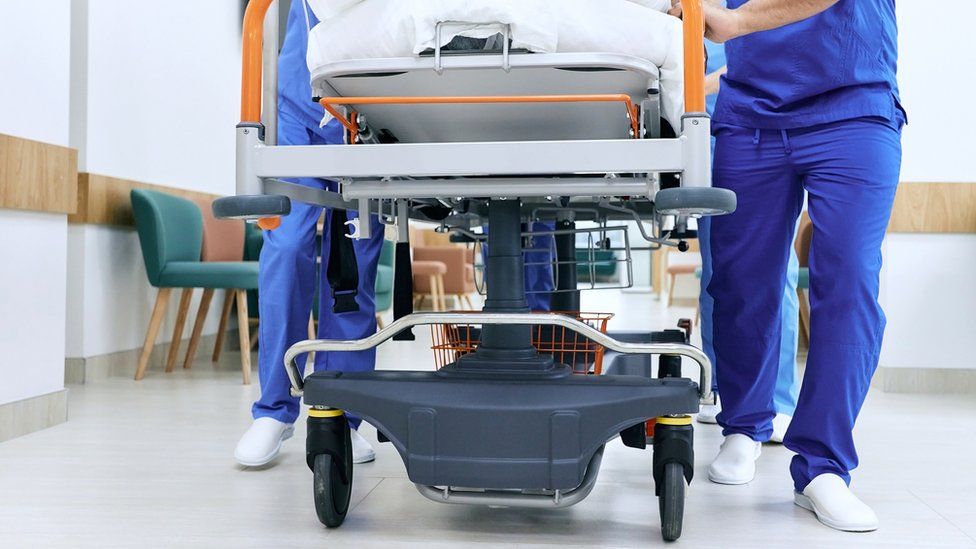ARTICLE AD BOX
 Image source, Getty Images
Image source, Getty Images
By Michelle Roberts
Digital health editor
The government has announced £250m in funding to provide an extra 5,000 NHS hospital beds in England this winter.
Ministers say 900 new beds should be ready by January, with the remainder to follow soon after, boosting capacity and helping lower record waiting lists.
The increase will mean nearly 100,000 permanent beds on wards and in A&E, available at the busiest time of the year - a 5% rise on current levels.
NHS Providers said the extra capacity was needed "before winter begins".
Miriam Deakin, director of policy and strategy at NHS Providers, said trusts would welcome the support but cautioned any new beds would need to be staffed.
She added that, since winter is the busiest time of the year for urgent and emergency care, trust leaders would be concerned that the promised extra capacity is only expected to be in place by January.
"For the best results, trusts would need these new beds before winter begins," she said.
Pat Cullen, from the Royal College of Nursing, added: "The elephant in the room is who will staff these additional beds? Nursing staff are already spread too thinly over too many patients."
Co-ordinated follow-up care
The government money will also fund services where people can be treated without requiring a hospital stay.
Funding will be focused on developing or expanding urgent treatment centres and same-day emergency care services, where patients can be seen quickly without the necessity of being admitted to hospital.
NHS England is also preparing to make it easier to discharge hospital patients when they are medically-fit to leave, through the rollout of so-called "care traffic control centres".
These bring together the NHS community, housing and charity teams to help co-ordinate support for those patients who require continuing care once they are discharged from hospital.
The aim is that plans for a prompt and efficient discharge can be drawn up shortly after patients are first admitted to hospital, thanks to better co-ordination among teams regarding follow-up care.
Alongside these measures, there will be at least 10,000 'virtual' hospital beds available by autumn, allowing some patients to be monitored in their home.
It comes after new data from NHS England revealed waiting lists had reached a record 7.6 million at the end of June.
'Longer-term challenges'
Prime Minister Rishi Sunak said the planning for winter had started "earlier than ever before" and that the public could be reassured the NHS would be given the resources it needs.
"These 900 new beds will mean more people can be treated quickly, speeding up flow through hospitals and reducing frustratingly long waits for treatment," he said.
Health Secretary Steve Barclay said: "We know that winter is a difficult time, so we're working to get ahead of pressures whilst also creating a sustainable NHS fit for the future."
NHS chief executive Amanda Pritchard said: "Winter is always a busy time for the NHS and so it is right that we put robust plans in place as early as possible to boost capacity and help front-line staff to prepare for additional pressure.
"Our winter plans, which build on the progress already made on our urgent and emergency care recovery plan, aim to reduce waiting times for patients, and to transform services with an expansion of same-day care and virtual wards, helping patients to be cared for in their own home where possible."
But certain longer-term issues have yet to be addressed, warned Ms Deakin from NHS Providers.
"Underlying issues, including workforce shortages, a lack of investment in capital and the desperate need for social care reform will ultimately hinder progress unless also addressed," she said.
"It will also be important to understand where new beds are being created, and where beds are being freed up by better means of meeting patients' needs - through care at home or same-day emergency care, for example.
"Steps like this are promising, but the only way to recover urgent and emergency care - and to put the NHS on a sustainable footing - is for the government to tackle the longer-term challenges in health and care," she said.

 1 year ago
32
1 year ago
32








 English (US) ·
English (US) ·